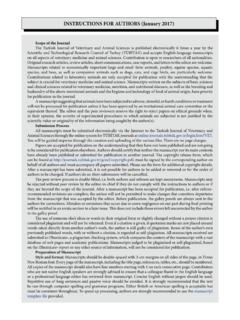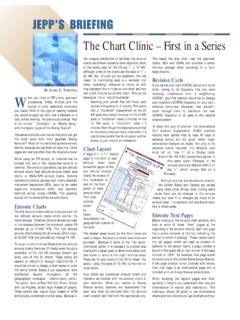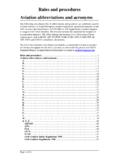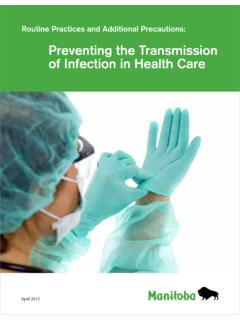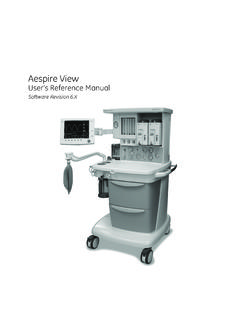Transcription of Clinical guidelines - 2016 (Updated: 21 September …
1 Clinical guidelinesDiagnosis and treatment manualFor curative programmes in hospitals and dispensariesGuidance for prescribing2016 editionEditorial committeeV ronique Grouzard, Jean Rigal, Marianne SuttonWith the participation ofP. Albajar, S. Balkan, P. Barel, E. Baron, T. Baubet, M. Biot, F. Boillot, L. Bonte, Bottineau, Burny, V. Captier, M. Cereceda, F. Charles, de Chazelles, D. Ch dorge, Coutin,C. Danet, B. Dehaye, K. Dilworth, F. Drogoul, F. Fermon, B. Graz, M. Gueguen, B. Guyard-Boileau,G. Hanquet, G. Harczi, M. van Herp, L. Hiffler, C. Hook, V. Ioos, K. de Jong, R. Kanapathipillai,S. Lagrange, E. Lasry, X. Lassalle, B. Laumont, D. Laureillard, P. Lechevalier, M. Lekkerkerker,D. Martinez, J. Menschik, D. Mesia, A. Minetti, R. Murphy, R. Petrucci, N. Peyraud, S. Pilon,K. Ritmeijer, L. Shanks, M. de Smet, S. Seyfert, J. Stassijns, J. Thompson, F. Varaine, B.
2 Vasset,I. ZunigaWe thank for their contributions to this guide Borkan, E. Bottieau, O. Bouchaud, M. Boussinesq,A. Briend, Briere, F. Chappuis, Chippaux, J. Dupouy Camet, F. Delange, O. Fontaine, Fournier, F. Van Gompel, M. Goyffon, S. Halperin, J. Janin, B. Lagard re, Law-Koune,P. Niaudet, F. Nosten, G. Potel, Rey, M. Rosenheim, J. Ross, Rupprecht, J. Sal Ra ch,P. P rez Simarro, M. Soriano, K. Stille, G. Tchernia, T. Vallot, P. Vigeral, M. Warrell, A. Weissmanand N. ronique Grouzard and Marianne SuttonDesign and layoutEvelyne LaissuIllustrationsGermain P ronnePublished byM decins Sans Fronti res M decins Sans Fronti res, 2016 All rights reserved for all countries. No reproduction, translation and adaptation may be donewithout the prior permission of the Copyright decins Sans Fronti res. Clinical guidelines - Diagnosis and treatment manual . 2016 978-2-37585-001-5 ForewordThis diagnostic and treatment manual is designed for use by medical professionals involved incurative care at the dispensary and hospital have tried to respond in the simplest and most practical way possible to the questions andproblems faced by field medical staff, using the accumulated field experience of M decins SansFronti res, the recommendations of reference organizations such as the World HealthOrganization (WHO) and specialized works in each edition touches on the curative and, to a lesser extent, the preventive aspects of the maindiseases encountered in the field.
3 The list is incomplete, but covers the essential manual is used not only in programmes supported by M decins Sans Fronti res, but alsoin other programmes and in other contexts. It is notably an integral part of the WHOE mergency Health decins Sans Fronti res has also issued French and Spanish editions. Editions in otherlanguages have also been produced in the manual is a collaborative effort of medical professionals from many disciplines, all withfield all efforts, it is possible that certain errors may have been overlooked in this inform the authors of any errors detected. It is important to remember, that if in doubt,it is the responsibility of the prescribing medical professional to ensure that the doses indicatedin this manual conform to the manufacturer s authors would be grateful for any comments or criticisms to ensure that this manualcontinues to evolve and remains adapted to the reality of the should be addressed to:M decins Sans Fronti res - Guidelines8, rue St-Sabin - 75011 ParisTel.
4 : +33.(0) : +33.(0) : manual is also available on the internet at As treatment protocolsfor certain diseases are constantly changing, medical staff are encouraged to check this websitefor updates of this to use this manualOrganizationThere are two easy ways to find information in this manual : The table of contentsat the beginning of the manual with the number and title of eachchapter, their subsections and page numbers; An alphabetical indexat the end of the manual with the names of the diseases of drugsThe International Non-proprietary Name (INN) of drugs is used in this manual . A list of currentproprietary names can be found at the end of the usedUnitsAdministration routekg= kilogramPO = per os oralg=gramIM = intramuscularmg = milligramIO = intraosseous g= microgramIV = intravenousUI= international unitSC = subcutaneousM=millionmmol = millimoleml= millilitredl= decilitreFor certain drugsNSAID= nonsteroidal anti-inflammatory drugSMX + TMP = sulfamethoxazole + trimethoprim = cotrimoxazoleExpression of doses Doses of the combination sulfamethoxazole + trimethoprim (cotrimoxazole) are expressed asSMX + TMP, for example:Children: 30 mg SMX + 6 mg TMP/kg/dayAdults: 1600 mg SMX + 320 mg TMP/day Doses of the combination amoxicillin + clavulanic acid (co-amoxiclav) are expressed inamoxicillin.
5 Doses of certain antimalarial drugs are expressed in base (and not in salts). Doses of iron are expressed in elemental iron (and not in ferrous salts).4 Table of 1: A few symptoms and ..27 Pain .. acute malnutrition ..41 Chapter 2: Respiratory diseasesAcute upper airway obstruction ..47 Rhinitis and rhinopharyngitis (common cold)..49 Acute sinusitis ..50 Acute pharyngitis ..52 Diphtheria ..55 Other upper respiratory tract infections ..58 Laryngotracheitis and laryngotracheobronchitis (croup).. otitis otitis media (AOM)..62 Chronic suppurative otitis media (CSOM)..64 Whooping cough (pertussis) ..69 Acute in children under 5 years of in children over 5 years and attack (acute asthma)..80 Chronic tuberculosis ..85 Chapter 3: Gastrointestinal disordersAcute diarrhoea .. of the stomach and duodenum ..95 Gastro-oesophageal and duodenal ulcers in and oropharyngeal infectious from scurvy (vitamin C deficiency).
6 100 Other lesions resulting from a nutritional : Skin diseasesDermatology ..103 Scabies ..104 Lice (pediculosis)..107 Superficial fungal skin infections .. and and (Hansen s disease)..119 Herpes simplex and herpes zoster (shingles)..122 Other skin (dermatitis)..123 Seborrheic : Eye diseasesXerophthalmia (vitamin A deficiency)..127 Conjunctivitis ..129 Neonatal epidemic ..132 Periorbital and orbital pathologies .. 6: Parasitic diseasesProtozoan african trypanosomiasis ..148 American protozoan infections (parasitic diarrhoea) ..156 Helminthic infections ..163 Filariasis .. filariasis (LF)..170 Chapter7: Bacterial diseasesBacterial meningitis ..175 Tetanus ..180 Typhoid .. fever (borreliosis) ..194 Louse-borne relapsing fever (LBRF)..194 Tick-borne relapsing fever (TBRF)..195 Eruptive : Viral haemorrhagic infection and : Genito-urinary diseasesUro-nephrologic diseasesNephrotic syndrome in children.
7 239 Urolithiasis ..243 Acute infections (GI)..249 Urethral discharge ..251 Abnormal vaginal ulcers ..256 Lower abdominal pain in women ..259 Upper genital tract infections (UGTI)..260 Veneral genital infections (summary).. : Medical and minor surgical of a simple ulcers ..300 Necrotising infections of the skin and soft bites and : Mental/psychical disorders in adultsAnxiety ..311 Insomnia .. stress ..316 Psychotic disorders ..319 Acute psychotic : Other conditionsSickle cell ..331 Heart failure in adults ..335 Endemic goitre and iodine Normal daily maintenance IV fluids in children > 1 month and adults ..3431b. x daily maintenance IV fluids in children > 1 month and Assessment and treatment of diarrhoea - The interagency emergency health kit,Annex 2 - Practical advice for writing medical certificates in the event of sexual Clinical guidelinesshould be viewed as an aid in prescribing treatment.
8 They do not gointo detail on public health measures like immunisation and nutrition programmes, or hygieneand sanitation procedures, for managing the health of a population; these are covered in otherpublications. They do, however, talk about preventive measures such as vaccines thatpatients can be offered to protect them from guidelines primary objective is to cure an individual patient of his disease, and tominimise the impact of that disease on both the patient and those around him (the risk oftransmission, for example).But well-organised, carefully-followed treatments for high priority pathologies such asinfectious diseases also reduce mortality in the population. And if enough patients aretreated for endemic diseases like tuberculosis, transmission will be activities should focus on priority targets, in terms of both diseases and particularlyvulnerable populations.
9 All prescribers should be familiar with the epidemiological situationaround the medical facilities in which they practice (epidemic and endemic diseases, thefrequency of traumatic injuries, etc.), and with the demographics of the population they serve(proportion of children under five and pregnant women, as they are more vulnerable).The treatment protocols and drugs that are used must be adapted to the epidemiologicalcircumstances; that is the aim of both this publication and Essential drugs - practical two sets of guidelines use a narrow list of drugs based on the World HealthOrganization s (WHO) model list of essential medicines. Health ministries may, however, havetheir own national list of essential drugs and treatment protocols that must be quality of prescribing relies on prescribers (health workers, physician s assistants, nurses,midwives and physicians) being properly trained.
10 It will vary depending on the region and onthe level of both their training and the medical facility in which they work (health post, healthcentre or hospital). As that level must often be evaluated to ensure that training is adequate,this publication and the Essential drugsfactsheets can be used as a drugs are chosen based on: Their efficacy and tolerance (few adverse effects); Their ease of administration, duration of action, number of daily doses and ease ofadherence; Their stability at room temperature, availability, and WHO model list of essential medicines is the basic tool for this selection, which should befine-tuned to the epidemiological profile of the region, the skills of the medical staff and thepossibility of referral to a higher-level medical most important basic rule for a prescribing programme is standardised treatmentprotocols. These is essential to the overall effectiveness of the treatments offered, health carestaff training and programme continuity during staff protocols in these guidelines were written according to the following principles: All drugs are designated by their international non-proprietary name (INN).
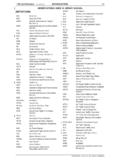
![Pneumonia (Ventilator-associated [VAP] and non …](/cache/preview/d/3/6/5/6/9/b/6/thumb-d36569b6dc8a7d8c6714d2f268ee79b7.jpg)
